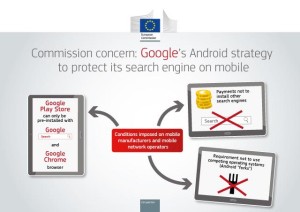| April 25, 2016 Here are some of the developments in antitrust news this past week that we found interesting and are following. EU Regulators Set to Warn Halliburton on Baker Hughes Deal: Sources. European Union antitrust regulators are planning to warn U.S. oil industry services group Halliburton Co that its plan to buy Baker Hughes will hurt competition, according to sources. The move would add to Halliburton’s woes after the U.S. Justice Department filed a lawsuit this month to stop the deal because the combined company would only compete with Schlumberger NV in 20 business lines in the global well drilling and oil industry construction services industry. Such a warning typically means the EU watchdog is poised to block a merger unless companies provide concessions to address its concerns. Microsoft and Google Agree to Drop Mutual Complaints. Microsoft and Google have agreed to withdraw complaints against each other with regulators around the world, as the two American tech giants continued recent efforts to settle the once-bitter conflicts between them. The two companies also said they would try to resolve future squabbles before complaining to regulators, as they have in the past. Trading Start-Up Files Antitrust Lawsuit in New York. Derivatives trading start-up TeraExchange has filed an antitrust lawsuit in the U.S. District Court for the Southern District of New York alleging that some of the biggest banks in the world conspired to block customers from using its service. The suit charges that 12 banks conspired to keep investors from trading interest rates swaps on its platform, which was founded in 2010. Bank of America Merrill Lynch, Barclays, BNP Paribas, Citigroup, Credit Suisse, Deutsche Bank, Goldman Sachs, HSBC, JP Morgan, Morgan Stanley, RBS and UBS were named in the suit. Glaxo, Other Drug Makers Appeal UK Fines for Pay-to-Delay Deals. GlaxoSmithKline is appealing a $54.5 million fine that was recently levied by UK regulators for illegally conspiring with several generic rivals to delay marketing of a lower-cost version of its Paxil antidepressant. The generic manufacturers were also fined a total of about $7 million and are appealing those decisions, as well. The appeals come two months after the UK Competitions and Market Authority found that between 2001 and 2004, Glaxo made payments totaling about $72 million to several generic companies as part of a settlement to end patent litigation that was filed by Glaxo against the generic drug makers. In its appeal, Glaxo argued that the UK regulators failed to prove the deals restricted competition and that its own tactics did not constitute abuse of a dominant position in the market for antidepressants. Leave a comment » Categories: Antitrust Enforcement, Antitrust Litigation, International Competition Issues April 20, 2016 
A View from Constantine Cannon’s London Office By Richard Pike and Yulia Tosheva Just as expected, following a one-year investigation and a number of information requests, the European Commission formally announced today that it is accusing Google’s parent company, Alphabet, of abusing its dominant position in relation to the Android mobile operating system. Google is already facing antitrust charges from Brussels over promoting its own shopping service in online searches. The stakes seem higher for Google in the Android case, however, as it made about $11 billion last year from advertising sales on Android phones through its apps such as Maps, Search and Gmail, according to estimates by financial analyst Richard Windsor.[1] About 80% of smartphones and tablets globally run on Android.[2] 
click here for more » Leave a comment » Categories: Antitrust Enforcement, International Competition Issues April 18, 2016 Here are some of the developments in antitrust news this past week that we found interesting and are following. Rise of Institutional Investors Raises Questions of Collusion. BlackRock, Vanguard and other big institutional investors own roughly 70 percent of the public stock market, according to some reports. People are starting to ask whether this allows companies — now having the same owners — to compete less and raise prices. In Senate testimony last month, the Justice Department’s antitrust chief, William J. Baer, said the department was investigating the potential antitrust implications of the rise of institutional shareholders. Exclusive: Trading start-ups prep major bank antitrust suits. Two online trading start-ups are reportedly preparing antitrust suits alleging that major banks conspired to block customers from using their platforms to trade interest rate swaps. TeraExchange and Javelin Capital Markets will claim the banks threatened to cut off customers who tried to trade on the platforms, according to sources. Bank of America Merrill Lynch, Barclays, BNP Paribas, Citigroup, Credit Suisse, Deutsche Bank, Goldman Sachs, HSBC, JP Morgan, Morgan Stanley, Royal Bank of Scotland and UBS will be named, the sources said. Deutsche Bank settles U.S. gold, silver price-fixing litigation. Deutsche Bank AG has agreed to settle U.S. lawsuits accusing it of conspiring with other banks to manipulate gold and silver prices at investors’ expense, according to court papers. The settlements were disclosed in letters filed in Manhattan federal court by lawyers representing investors and traders who accused Deutsche Bank of violating U.S. antitrust law. Terms were not disclosed, but both settlements will include monetary payments by the German bank. Deutsche Bank also agreed to help the plaintiffs pursue claims against other defendants. Canadian Pacific Ends Bid for Norfolk Southern. After five months of pressure, three merger offers and one rejection from regulators, Canadian Pacific Railway said that it had abandoned efforts to combine with its American railroad counterpart Norfolk Southern. Canadian Pacific withdrew a resolution for Norfolk Southern shareholders to vote on negotiations between the two companies, according to a statement by Canadian Pacific. Norfolk Southern resisted the proposed railroad merger from the beginning, and the termination joins a string of proposed deals that have fallen apart in the last week because of regulatory concerns. Leave a comment » Categories: Antitrust Enforcement, Antitrust Litigation April 11, 2016 Here are some of the developments in antitrust news this past week that we found interesting and are following. U.S. Sues ValueAct, Saying Hedge Fund Violated Antitrust Law. Not long after Baker Hughes and Halliburton announced a merger agreement in November 2014, the prominent hedge fund ValueAct started acquiring stakes in both energy giants. The hedge fund came up with a plan if the $35 billion deal turned messy: to push the chief executives to do what it took to ensure the deal went through. That strategy (and when ValueAct came up with it) is at the heart of a $19 million antitrust lawsuit filed by the U.S. Department of Justice. According to the government, ValueAct violated the Hart-Scott-Rodino Act when it failed to notify regulators upon acquiring about $2.5 billion worth of stock in both Baker Hughes and Halliburton. Mega deals morph into mega problems for Wall Street. Some of the mega transactions that had champagne corks popping in boardrooms are running into antitrust problems and, in the case of pharmaceutical firm Pfizer Inc’s $160 billion takeover of rival Allergan PLC, political opposition to a deal that envisaged the biggest drug company in the United States moving to Ireland to lower its taxes. The U.S. Treasury unveiled new rules last week that, while they did not name Pfizer and Allergan, had provisions that targeted a specific feature of their agreement and prompted both parties to walk away from what would have been the second-largest deal of all time. The move by the Obama administration to change the rules has sent a chilling message to dealmakers and comes on top of a number of legal challenges to big transactions such as Halliburton Co’s takeover of rival oil services company Baker Hughes Inc. on antitrust grounds. Justice Dept. Sues to Block Halliburton-Baker Hughes Merger. The U.S. Department of Justice is suing to block the pending merger of Halliburton and Baker Hughes, the latest instance of the Obama administration taking a tougher stance on big-ticket deals. In its lawsuit, filed in federal court in Delaware, the Justice Department is arguing that combining the two oil field services companies would cut competition in the industry to unacceptable levels. “The proposed deal between Halliburton and Baker Hughes would eliminate vital competition, skew energy markets and harm American consumers,” Attorney General Loretta E. Lynch said in a statement. EU cuts SocGen antitrust fine by about half to 227.7 mln euros. European Union antitrust regulators have cut Societe Generale’s rate-rigging fine by 49 percent to 227.72 million euros ($259.24 million) after the French lender recalculated the value of its sales. France’s second-largest bank was hit with a fine of 446 million euros in December 2013, one of seven banks charged with rigging the euro interbank offered rate (Euribor) as a cartel. “The amended fine is based on the amended value of sales data provided by Societe Generale in February 2016 after the bank realised that it had initially provided incorrect data to the Commission,” the European Commission said in a statement. Leave a comment » Categories: Uncategorized April 4, 2016 Here are some of the developments in antitrust news this past week that we found interesting and are following. FTC Accuses Endo, Other Drugmakers of Antitrust Violations. The Federal Trade Commission has accused several drugmakers of violating antitrust laws by agreeing to delay the U.S. launches of cheaper generic versions of two popular pain treatments. It’s the first so-called “pay for delay” case brought by the FTC in which a drug’s original maker agreed not to sell its own “authorized generic” version until well after a generic drugmaker began selling its product. These arrangements guaranteed the generic drugmakers would have no competition, and so could keep prices high, for at least six months. The FTC alleges Endo Pharmaceuticals Inc., maker of Opana ER pain pills and the Lidoderm pain patch, paid Impax Laboratories Inc. and Watson Laboratories Inc., respectively, to delay selling their approved generic versions. Uber CEO must face price-fixing lawsuit by passengers -U.S. judge. Uber CEO Travis Kalanick failed on Thursday to win the dismissal of an antitrust lawsuit accusing him of scheming to drive up prices for passengers who use the popular ride-sharing service. U.S. District Judge Jed Rakoff in Manhattan said Kalanick must face claims he conspired with drivers to ensure they charge prices set by an algorithm in the Uber smartphone app to hail rides, including “surge pricing” during periods of peak demand. The plaintiffs claim that drivers conspired with Kalanick to charge fares set by the algorithm, with an understanding that other Uber drivers would do the same, even if they might fare better acting on their own. China antitrust proposals trigger foreign business fears over IP protection. Foreign companies with dominant market positions could be increasingly forced to license technology to competitors or face sanctions under China’s latest draft antitrust policy guidelines, according to foreign business groups and attorneys. The proposals include a so-called “essential facilities” doctrine, which assumes some core infrastructure and technology is so important, or the barriers to entry so high, that refusal to share constitutes monopolistic behavior. If interpreted broadly, China’s antitrust policy could force companies to license their intellectual property to Chinese competitors or lower licensing costs to benefit local firms, at a time when China is seeking to promote domestic champions. EU Opens In-Depth Investigation Into Hutchison, Vimpelcom Italian Deal. European Union antitrust regulators have opened an in-depth investigation into Hutchison’s planned merger of its Italian mobile telecoms business with Vimpelcom’s, on concerns it could lead to higher prices for consumers. “The Commission has concerns that the transaction could lead to higher prices, less choice and reduced innovation for mobile customers in Italy,” the European Commission said in a statement on Wednesday. Leave a comment » Categories: Antitrust Enforcement, Antitrust Litigation, International Competition Issues « Previous Entries | | | |


